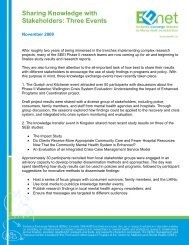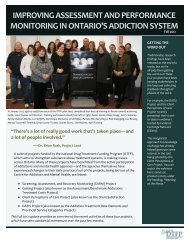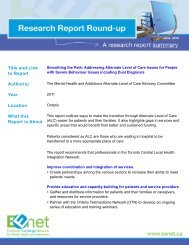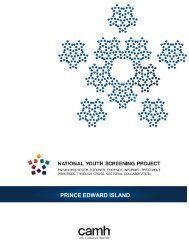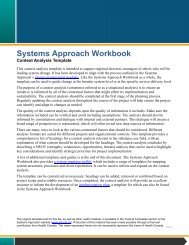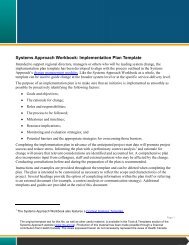Implementation of Early Psychosis Intervention Program ... - EENet
Implementation of Early Psychosis Intervention Program ... - EENet
Implementation of Early Psychosis Intervention Program ... - EENet
You also want an ePaper? Increase the reach of your titles
YUMPU automatically turns print PDFs into web optimized ePapers that Google loves.
66Standard 4: Psychosocial Support for the ClientStandard 4 indicates the importance <strong>of</strong> psychosocial supports to help clients to maintain orresume their usual roles within the community, and to promote hope for the future. Psychosocialcare is to be provided consistently and assertively, and tailored to the needs <strong>of</strong> the client.Supports may be <strong>of</strong>fered within the team or through agreements with local providers <strong>of</strong>educational, vocational, skills development, housing or other services.Summary <strong>of</strong> Results:<strong>Program</strong>s were asked about their ability to deliver a range <strong>of</strong> psychosocial supports. Responsesindicated that:o Most programs are able to provide illness management most <strong>of</strong> the time.o About 70% can provide/ensure access to activities <strong>of</strong> daily living, social relationship andsubstance use support most <strong>of</strong> the time.o Rates were lower for education, income management, recreational, vocational and housingsupport (about half).o Only 37% <strong>of</strong> sites were able to provide or ensure access to self-help or peer support most <strong>of</strong>the time.o Psychosocial supports are provided either by internal staff or through referral. Manyprograms reported that mainstream supports were not appropriate (60%) or available (56%).Internally, programs noted a lack <strong>of</strong> resources (42%) and staff time (39%), especially forsmall programs.o Proactive effort may help to make community specialized services more accessible andappropriate for EPI program clients – this could require area/network level effort.Table 26: How <strong>of</strong>ten able to provide/ensure access ‘most <strong>of</strong> the time’ (Q 116)Supports for Clients% yesIllness management 89Substance use service 71Social relationship development 69Activities <strong>of</strong> daily living support 69Educational support 62Income management support 60Recreational support 54Vocational support 52Housing support 46Self-help/peer support 37



